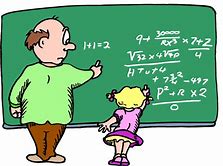
Make your child a Math Whiz
The main problem for most students driving them away from enjoying mathematics is the way the subject is taught to them in schools and homes leading to a fear or dislike of math resulting in poor math performance. Teaching math to your child should go beyond pencil and paper to make math a learning experience that's fun for you and your kid. Invest in teaching aids such as Abacus, Flash Cards, reading clocks, maps etc. Start young!
Use Everyday Objects: You already have everything you need to begin teaching math to your child in the home and environment. Buttons, coins, books, fruits, trees, cars -- you can't count the number of objects you have available! Math is easy to teach when you look at all of the physical objects you can count, add, subtract and multiply.

Play Math Games: There are plenty of games on the market that promise to aid you in teaching math. Board games with dice, puzzles and activities take the boredom out of learning. Some of the best math games come from your own imagination. Begin basic counting skills with blocks. Math can become an activity to enjoy rather than an educational drill.
Numbers Count!: Teaching math begins with your child knowing her numbers. You can help her learn to count with the same strategies you'll be using to teach her math. Once she begins counting, you're ready to start with some basic math principles with hands-on experience.
Household chores: Baking, cooking, doing laundry, arranging furniture can also be great ways of not only involving children in housework but also teach a lot of math concepts.
Make Math a Daily Activity: Use math in your day-to-day routine and incorporate it into your daily life. Set learning goals at a traffic light, while shopping, dining, etc.
Prerequisite Math Skills

-
The ability to follow sequential directions.
-
A keen sense of directionality, of one's position in space, of spatial orientation and space organization. Examples include the ability to tell left from right, north/south/east/west, up/down, forward/backwards, horizontal/vertical/diagonal, etc.
-
Pattern recognition and its extension
-
Visualization: The ability to conjure up pictures in one's mind and manipulate them. Eg. 3 dimensional cube
-
Estimation: The ability to form a reasonable educated guess about size, amount, number, and magnitude.
-
Deductive reasoning: the ability to reason from the general principal to a particular instance, or reasoning from stated premise to a logical conclusion
-
Inductive reasoning: a natural understanding that is not the result of conscious attention or reasoning, easily seeing the patterns in different situations, and the interrelationships between procedures and concepts.
If you want your child to succeed at math, focus on the development of the prerequisite math-readiness skills in early childhood. Once you show him how much fun math can be, he'll gain an enthusiasm about learning that you can apply to other subjects. Once she enjoys learning, there's no stopping her. -